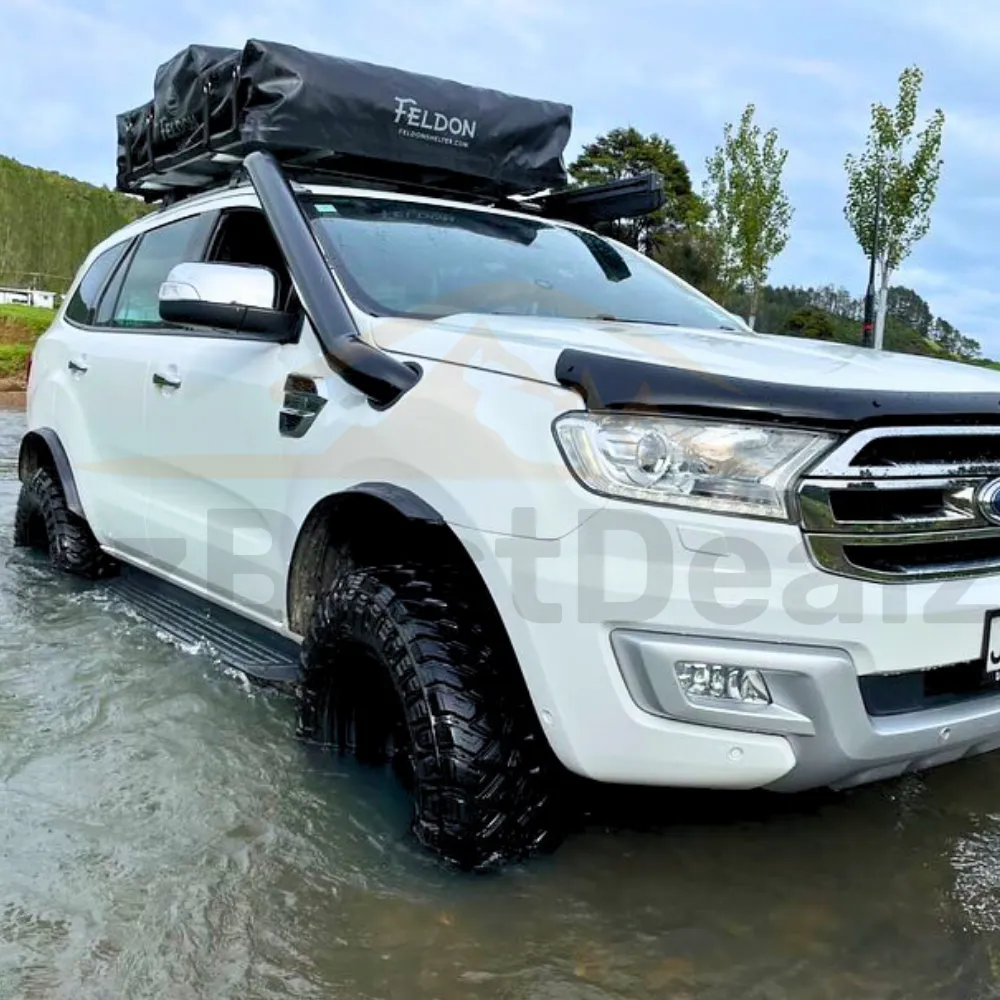Table of Contents
Thinking about taking your Ford Everest off-roading? Water crossings and dusty trails can be a real challenge, but a snorkel can make all the difference. A snorkel for your Ford Everest allows your engine to breathe cleaner, cooler air, even when submerged in water or driving through thick dust. This article serves as your comprehensive guide to selecting, installing, and maintaining a snorkel for your Ford Everest, ensuring you're prepared for any journey. We'll cover various snorkel types, installation processes, and essential maintenance tips to help you make an informed decision and keep your Everest performing at its best. This isn't just about surviving the mud; it's about mastering it. Let's explore into the world of Ford Everest snorkels.
Feature | Description |
|---|---|
Types of Snorkels | Safari, In-House Fabrication, Radius Fabrications, Torqit – each offers unique features and price points. |
Materials | High-quality UV-resistant polyethylene and stainless steel are common choices, offering varying degrees of durability and aesthetics. |
Installation | Professional installation is recommended for optimal performance and warranty compliance. |
Maintenance | Regular cleaning and inspections are crucial for preventing debris buildup and ensuring proper airflow. |
Compatibility | Check compatibility with your specific Ford Everest model year (e.g., 2015-2021, 2022 Next-Gen). |
Benefits | Cooler, cleaner air intake; enhanced engine protection from water and dust; improved engine performance. |
Choosing the Right Snorkel Ford Everest: A Buyer's Guide

Choosing The Right Snorkel Ford Everest A Buyers Guide
Understanding Your Needs: On-Road vs. Off-Road
Hey there, fellow adventurer! Picking the perfect snorkel for your Ford Everest is like choosing the right tool for the job. Are you planning weekend jaunts on dusty backroads, or are you dreaming of conquering serious off-road challenges, including deep water crossings? Knowing this helps you choose the right snorkel. A basic snorkel might be fine for light off-roading, but if you're tackling serious mud and water, you'll want something more robust. Think of it like this: a small spoon works fine for ice cream, but you wouldn't use it to build a castle in the sand! For more information on the capabilities of the Ford Everest, check out our detailed Ford Everest specs page.
Snorkel Type | Best For |
|---|---|
Basic Snorkel | Light off-roading, dusty conditions |
Heavy-Duty Snorkel | Serious off-roading, deep water crossings |
Considering the Features: Materials, Design, and Fit
Now, let's talk features. Snorkels are usually made from tough plastic or stainless steel. Stainless steel looks fancier, but plastic is often more durable and less likely to rust. The snorkel's design is crucial too. You want something that fits your Everest perfectly and doesn't obstruct your view or create unnecessary wind noise. A poorly designed snorkel can actually reduce your engine's performance, so don't skimp on quality! If you're thinking about upgrading your Everest's look, you might also be interested in our selection of rims for Ford Everest.
- Material: Plastic (durable, affordable) or Stainless Steel (stylish, potentially more prone to damage)
- Design: Consider airflow, placement, and overall aesthetics.
- Fit: Ensure a perfect fit for your specific Ford Everest model and year.
Remember, a snorkel is an investment. It's not just a flashy add-on; it's a vital piece of equipment that protects your engine. Don't rush the decision. Do your research, read reviews, and choose a snorkel that meets your needs and your budget. And if you're looking for an even more adventurous ride, you could always check out our range of Ford Everest Sport for sale.
Snorkel Ford Everest Installation: A Step-by-Step Guide

Snorkel Ford Everest Installation A Step By Step Guide
Okay, let's get this snorkel installed! Think of it like building a really cool LEGO castle for your engine – it needs to be sturdy and perfectly fitted. First, you'll need your snorkel kit, some basic tools (screwdrivers, wrenches, maybe a drill), and a friend to lend a hand. It's always easier with an extra pair of hands, especially when wrestling with those awkward parts. Before you start, check out our guide on to make sure you've got the right snorkel for your model. You wouldn't want to try and fit a square peg in a round hole, would you?
- Gather your tools and snorkel kit.
- Carefully read the installation instructions.
- Begin by securing the snorkel's base to the vehicle's body.
Next, carefully follow the instructions that come with your specific snorkel kit. Each brand is a little different, so paying attention to detail is key! Take your time, don't rush it, and if something doesn't seem right, stop and double-check. Remember, a perfectly fitted snorkel is a happy snorkel, and a happy snorkel means a happy engine! If you're feeling overwhelmed by all the technical stuff, consider checking out our Ford Everest recall information for a moment of less stressful reading.
Step | Action | Tip |
|---|---|---|
1 | Secure the snorkel base. | Use sealant for a watertight seal. |
2 | Connect the snorkel tube. | Ensure a snug fit to avoid leaks. |
3 | Attach the air intake. | Double-check all connections. |
Once the main snorkel tube is secured, you'll likely need to connect the air intake to the engine's airbox. Make sure this relationship is airtight to prevent water or dust from getting in. Again, take your time – a little extra care here will save you headaches later. While you are working on your Everest, if you are thinking about upgrading the look, consider checking out our range of to give your car a more stylish look.
"Patience is a virtue, especially when installing a snorkel." - Wise Old Mechanic (probably)
Finally, take your Everest for a test drive (in a safe area, of course!). Check for any leaks or unusual noises. If everything sounds and feels right, congratulations! You've successfully installed your snorkel. If not, don't panic. Go back over the steps, and if you're still stuck, consult the instructions again or seek help from a professional mechanic. Perhaps you could even check out our review of the Ford Everest Sport 2023 while you're taking a break.
- Test drive your Everest in a safe area.
- Listen for any unusual noises.
- Check for leaks.
Maintaining Your Snorkel Ford Everest for Optimal Performance
Keeping it Clean: A Snorkel's Best Friend is a Brush
Okay, so you've got your awesome snorkel installed. High five! But, like any piece of equipment that spends time battling mud, dust, and maybe even the occasional submerged log, your snorkel needs some TLC. Think of it like this: your snorkel's a superhero, protecting your engine from the nasty stuff. But even superheroes need a shower sometimes! Regular cleaning is essential. Dirt and debris can clog the intake, reducing airflow and potentially causing engine problems. I usually give mine a good scrub with a stiff brush and some soapy water every few weeks, or more often if I've been tackling seriously muddy trails. Make sure you dry it thoroughly afterwards to prevent rust, especially if you have a stainless steel snorkel. If you're looking to improve your Everest's off-road capabilities further, check out our guide on – you might find some useful tips there!
- Use a stiff brush and soapy water.
- Dry thoroughly after cleaning.
- Inspect for any cracks or damage.
Regular Inspections: Catching Problems Early
Regular inspections are just as important as cleaning. It's like giving your snorkel a quick health check. I usually do this before and after every major off-road exploration. Look closely for any cracks, loose fittings, or signs of damage. Remember, a tiny crack can let in a whole lot of trouble! If you spot anything suspicious, address it immediately. A small repair now can save you a major headache (and engine repair bill!) later. Also, keep an eye on the seals around the snorkel's base and the air intake. Any gaps could let in water or dust, so make sure everything's nice and tight. If you're looking for a more luxurious ride in the city after a muddy experience, check out our .
Inspection Item | What to Look For | Action |
|---|---|---|
Snorkel Body | Cracks, dents, or other damage | Repair or replace if necessary |
Seals | Leaks or gaps | Reseal or replace if necessary |
Air Intake | Blockages or damage | Clean or repair as needed |
Maintaining Peak Performance: The Long Game
Think of your snorkel as a long-term investment. Just like you'd service your engine regularly, you should also maintain your snorkel. This isn't just about keeping it clean and checking for damage; it's about ensuring it continues to perform at its best. Think of it as preventative maintenance – it's much better to catch small problems before they become big ones. Regularly check the air filter within the snorkel system. This is the snorkel's last line of defense against dust and debris. A clogged air filter restricts airflow and can hurt your engine. Replacing it regularly is crucial for maintaining optimal performance. If you're interested in a more powerful engine, you might want to check out information about and other updates.
"A little preventative maintenance goes a long way." - My Grandpa (who was a mechanic)
Conclusion: Breathing Easy
Choosing the right snorkel for your Ford Everest is a significant upgrade for off-road adventures. Remember, proper installation and regular maintenance are key to maximizing its benefits and extending its lifespan. With the right snorkel, you'll be ready to conquer any terrain, knowing your engine is breathing easy, even in the toughest conditions. Happy trails!